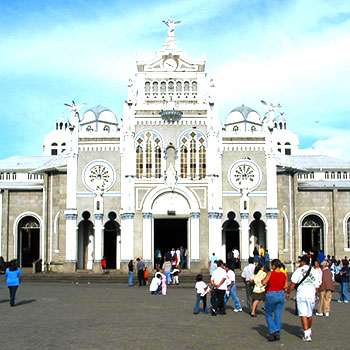ECON 3500 Introduction to Circular Economy
Spanish Language, Liberal Arts & Environmental Sciences Program
San Jose, Costa Rica
Dates: 10/1/22 - 12/23/22

ECON 3500 Introduction to Circular Economy
OVERVIEW
CEA CAPA Partner Institution: Veritas University
Location: San José, Costa Rica
Primary Subject Area: Economics
Instruction in: English
Course Code: ECON 3500
Transcript Source: Partner Institution
Course Details: Level 300
Recommended Semester Credits: 3
Contact Hours: 48
DESCRIPTION
We are currently on an unsustainable economic path. Our Earth is at risk of failing to provide the life support systems that we, as humans, need to live on this planet (clean air, water, food, among others). An increasing population with more financial means is putting enormous pressure on natural resources. More money means more consumption, more production, and ever-increasing use of natural resources.
We are currently consuming 1,75 times the Earth's carrying capacity, meaning that we are using 75% more natural resources than we are generating every year (Lacy et al., 2020). The consequences of our current (unsustainable) systems of consumption and production are staggering. Since the offset of the industrial revolution and our capitalist societies, we have lost an average of 68% of mammals, birds, fish and reptiles, and plants (WWF, 2020). The Latin American and Caribbean region has experienced the most significant loss: 95% of their biodiversity since 1970. The current emissions patterns are also increasing the average temperatures of our planet. By 2030, temperatures will likely increase 1,5 degrees if we continue in the same path. The economic losses of a 1,5-degree temperature rise are estimated at 58 trillion US in 2100 (IPCC, 2018). Is business, as usual, even an option?
We need to substantially rethink our current production systems and consumption based on a linear process of "take-make-waste." Instead, we need to look for business, societal, and economic models that use fewer resources and products that live longer lives and can be re- used at the end of their functional life. This is what the circular economy is about.
In this course, students will learn the principles of the circular economy and its practical application in the analysis of different industries and products used in our daily life: small electronics, textiles, or food. The course will combine lectures with practical exercises in which the students will discuss how different products could be designed from the start using a circular perspective; what new business opportunities emerge; what are the main challenges for a transition to a circular economy, and what policymakers and regulators can do to ease the transition to a circular economy.
We are currently consuming 1,75 times the Earth's carrying capacity, meaning that we are using 75% more natural resources than we are generating every year (Lacy et al., 2020). The consequences of our current (unsustainable) systems of consumption and production are staggering. Since the offset of the industrial revolution and our capitalist societies, we have lost an average of 68% of mammals, birds, fish and reptiles, and plants (WWF, 2020). The Latin American and Caribbean region has experienced the most significant loss: 95% of their biodiversity since 1970. The current emissions patterns are also increasing the average temperatures of our planet. By 2030, temperatures will likely increase 1,5 degrees if we continue in the same path. The economic losses of a 1,5-degree temperature rise are estimated at 58 trillion US in 2100 (IPCC, 2018). Is business, as usual, even an option?
We need to substantially rethink our current production systems and consumption based on a linear process of "take-make-waste." Instead, we need to look for business, societal, and economic models that use fewer resources and products that live longer lives and can be re- used at the end of their functional life. This is what the circular economy is about.
In this course, students will learn the principles of the circular economy and its practical application in the analysis of different industries and products used in our daily life: small electronics, textiles, or food. The course will combine lectures with practical exercises in which the students will discuss how different products could be designed from the start using a circular perspective; what new business opportunities emerge; what are the main challenges for a transition to a circular economy, and what policymakers and regulators can do to ease the transition to a circular economy.










